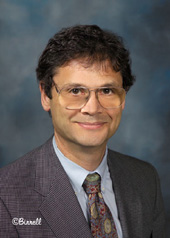 |
Stephen Rennard, M.D. |
The clinical trial will test the safety and effectiveness of a selective retinoid receptor agonist — called RAR gamma — to determine if the investigational compound can improve lung function in people with moderate to severe emphysema.
“This is a very important study,” said Stephen Rennard, M.D., Larson Professor of Medicine in the pulmonary and critical care section at UNMC. “We are hoping to recruit participants here.”
People who want to enroll in the trial must:
- Be age 45 or older;
- Have been diagnosed with emphysema by a CT scan;
- Have a history of smoking more than 10 packs per year; and
- Have not smoked for the past 12 months.
|
Emphysema affects more than two million Americans, obstructing the airflow in their lungs and making it difficult for them to breathe.
The study is designed to evaluate the effects of the investigational drug on certain receptors in the lung.
“This is the first emphysema study that will use computed tomography (CT) scans as well as standard lung function tests to measure participants’ lung function,” Dr. Rennard said. “CT scans can assess the extent of tissue damage in the lungs and determine whether the drug is making a difference.”
During the two-year study, participants will make about 15 visits to UNMC for various tests, including lung function, blood and urine specimens, X-rays and CT scans.
Some participants will take a pill form of RAR gamma once a day. Other participants will take a placebo once a day. Two out of three participants will receive the study drug. In addition, all participants will receive drug therapy with short-acting bronchodilators as needed and other medications.
Anyone interested in enrolling in the study can call toll-free 1-888-4-TESRA-0 (1-888-483-7720).
The study, which is being conducted in 65 medical centers worldwide, is sponsored by Hoffmann-La Roche Inc.